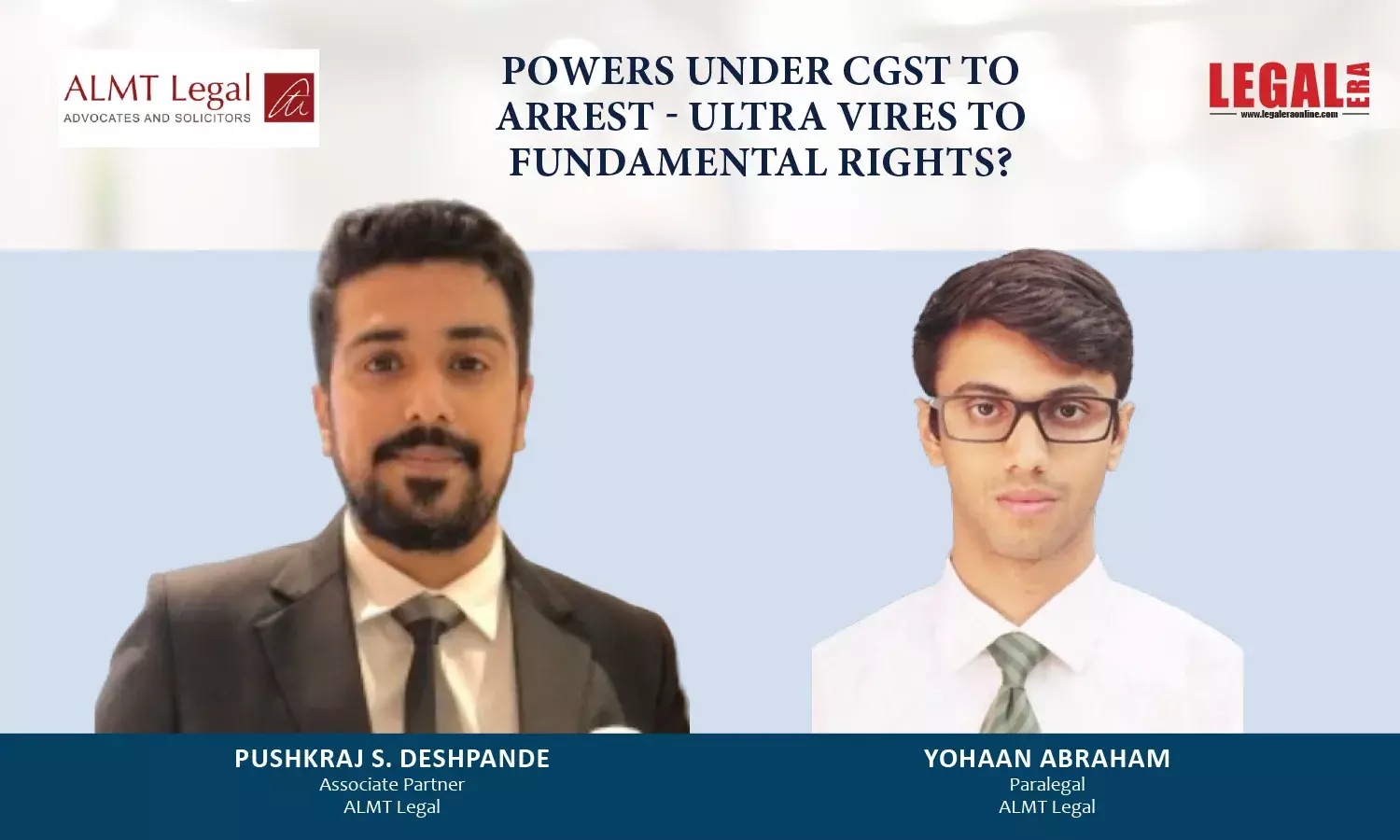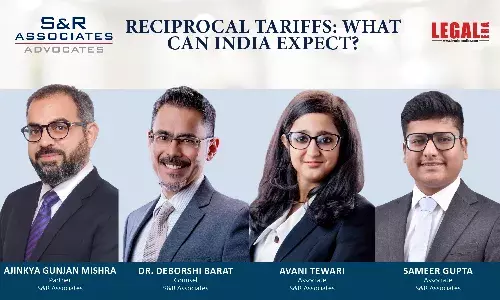Powers Under CGST To Arrest - Ultra Vires To Fundamental Rights?

Powers Under CGST To Arrest - Ultra Vires To Fundamental Rights? There are concerns over the absence of specific statutory provisions governing the arrest procedure in CGST matters as this raises the possibility of abuse of constitutional rights. India is one of the largest growing economies in the world and a strong contender to soon become the world’s third largest economy. Given the...
Powers Under CGST To Arrest - Ultra Vires To Fundamental Rights?
There are concerns over the absence of specific statutory provisions governing the arrest procedure in CGST matters as this raises the possibility of abuse of constitutional rights.
India is one of the largest growing economies in the world and a strong contender to soon become the world’s third largest economy. Given the rise in national and international trade, the legislature felt the need for change and the need to implement a more efficient and robust service tax mechanism. The intention of the legislature while enacting the Central Goods and Services Act, 2017 (“Act”) was not to enact legislation that was punitive but rather preventive in nature. However, practically speaking it observed that this legislation has conferred certain powers to CGST officers (“Officers”) under the Act which directly impact an individual’s right to life and personal liberty (as guaranteed under Article 21 of the Constitution of India). A close reading of these provisions raises several debatable questions, as to whether these powers are arbitrary and ultra vires to the Constitution of India.
For instance, the Act confers on Officers the power to arrest an individual when satisfied that the said individual has committed some crime under the Act. These Officers are not “police officers” as defined under section 2(o) of the Code of Criminal Procedure (“CrPC”) nor are they empowered under section 41 of the CrPC to arrest individuals. Proceedings conducted by Officers under the Act against an individual are “judicial proceedings” and not an “investigation” as per Chapter XII of the CrPC.
The key difference between a police officer and Officers under the Act is that police officers are governed by the state government and only have jurisdiction within a particular state. However, Officers under the Act are governed by the central government having jurisdiction pan-India.
The arbitrary nature of these enactments is further discussed in detail below:
The power to arrest is defined under section 69 of the Act. A person may be arrested where the Commissioner has “reasons to believe” that the alleged offender has committed a punishable offense under section 132 of the Act. The term “reasons to believe” which is the foundation of a CGST arrest has not been defined whatsoever under the statute.
These reasons to believe are not required to be recorded in writing, unlike the mandatory requirement under section 41 of the CrPC. In CGST matters, the only requirement for arrest is the “belief” of the Commissioner that the person has committed a punishable offence under the Act. The courts have held that the term “reason to believe” does not refer to an officer’s arbitrary power but there must be some subjectivity when exercising arrest in accordance with the restraints imposed by law.1
However, the broad wording of the statute and the lack of written accountability inherently allows for the potential abuse of discretion.
Non-applicability of the CrPC in CGST proceedings:
Unlike in criminal law which is governed by the Indian Penal Code, CrPC, and Indian Evidence Act, 1872, the CGST matters are selectively governed by CrPC where suitable. For instance, provisions relating to prearrest bail under section 438 CrPC are not applicable under the CGST Act2. Section 69 of the Act only provides for bail or default bail after the person is arrested and there is no possibility for prearrest bail in CGST matters. However, in the State of Gujarat vs. Choodamani Parmeshwaran Iyer & Anr., the Hon’ble Supreme Court held that one can seek prearrest protection by approaching the Hon’ble High Court under the writ jurisdiction of Article 226 of the Constitution.
Additionally, the provisions of chapter XII3 of the CrPC are not applicable to the CGST Act. Chapter XII mainly concerns the filing of a First Information Report (FIR), the examination of witnesses by the police, the procedure of investigation, and the filing of a final report by the police. The said chapter does not apply to CGST as the Officers are not police officers. Since the CGST Act is silent on the aforesaid procedures, the actions of the Officers are not regulated by any legislation.
It is a common practice of Officers to summon a person under section 70 of the CGST Act without specifying if the summoned person is a witness or an accused. Since the person summoned is not aware of his role in the investigation, the said person is unable to approach the appropriate judicial authority to seek pre-emptive protection. Under section 70 (2) of the CGST Act, inquiries in CGST matters are deemed to be “judicial proceedings”. In light of this, it may be argued that the unfettered powers available to Officers blur the separation of powers between law-and-order enforcement and the judiciary.
It has also been observed that due to the absence of supervisory provisions like that of Chapter XII of the CrPC, the Officers are conducting investigations in contravention of criminal and constitutional laws. This is evident from the fact that it is a common practice for Officers to summon a person under section 70 of the Act without disclosing the nature of the summoned person’s involvement in the investigation. The summoned person is generally called for tendering oral evidence as a witness. However, upon arrival, he is detained on the pretext of statement recording for lengthy hours and in some instances, days together. Subsequently, he is made an accused and arrested after detention in custody for more than 24 hours. It is a settled principle of law under section 164 CrPC and under Article 22 that no person shall be illegally detained in custody for more than 24 hours without producing them before the nearest Magistrate. This occurs because there are no explicit provisions for custody under the CGST Act. A person produced before the Magistrate ought to be remanded to judicial custody directly. This consequently limits the power of the Magistrate to apply his judicial mind on the merits matter and the Magistrate’s decision-making process is followed mechanically.
Courts throughout the country have come down heavily on central agencies such as the Directorate of Enforcement, Customs Department and CGST for the practice of detaining people in their custody for periods exceeding 24 hours without producing them before the concerned judicial magistrate. In one such matter, the Hon’ble Bombay High Court has held that the right to sleep is a basic human right4. The Court further disapproved of this practice and issued strictures against the Directorate of Enforcement. Recently, the Hon’ble Bombay High court, while granting interim bail to the Petitioner, deprecated the CGST officers for detaining a person overnight under the guise of recording statement and further observed that arrest is a serious matter and cannot be made on mere allegation5. A group of petitions challenging the vires of provisions empowering arrest under CGST has been filed before the Hon’ble Supreme Court. The Hon’ble Supreme Court has stayed the investigation in all these matters and directed the CGST department to not take coercive steps against the petitioners. As on the date of writing this article, the said set of petitions is pending adjudication before the Hon’ble Supreme Court6.
From the above discussion, it can be seen how the absence of specific statutory provisions governing the arrest procedure in CGST matters allows for the possibility of abuse of constitutional rights. It is therefore proposed that either chapter XII of the CrPC and prearrest bail be made available in CGST matters or that CGST Officers be held as police officers. Implementing either of the mentioned statutory reforms will help ensure that legislation meant to govern tax in no way infringes upon the individuals’ constitutional guarantees.
Disclaimer – The views expressed in this article are the personal views of the authors and are purely informative in nature.
2. State of Gujarat v. Choodamani Parmeshwaran Iyer & Anr. SLP(Crl.) No. 4212-4213 of 2019
3. Information to Police and their powers to Investigate (CrPC pg. viii Criminal Manual Professional)
4. Ram Kotumal Issrani vs. Directorate of Enforcement Cri WP (ST) no. 15417 of 2023
5. Mahesh Devchand Gala Vs Union of India Cr WP 938 of 2024
6. Radhika Agarwal vs. Union of India Cri WP 336 of 2018





